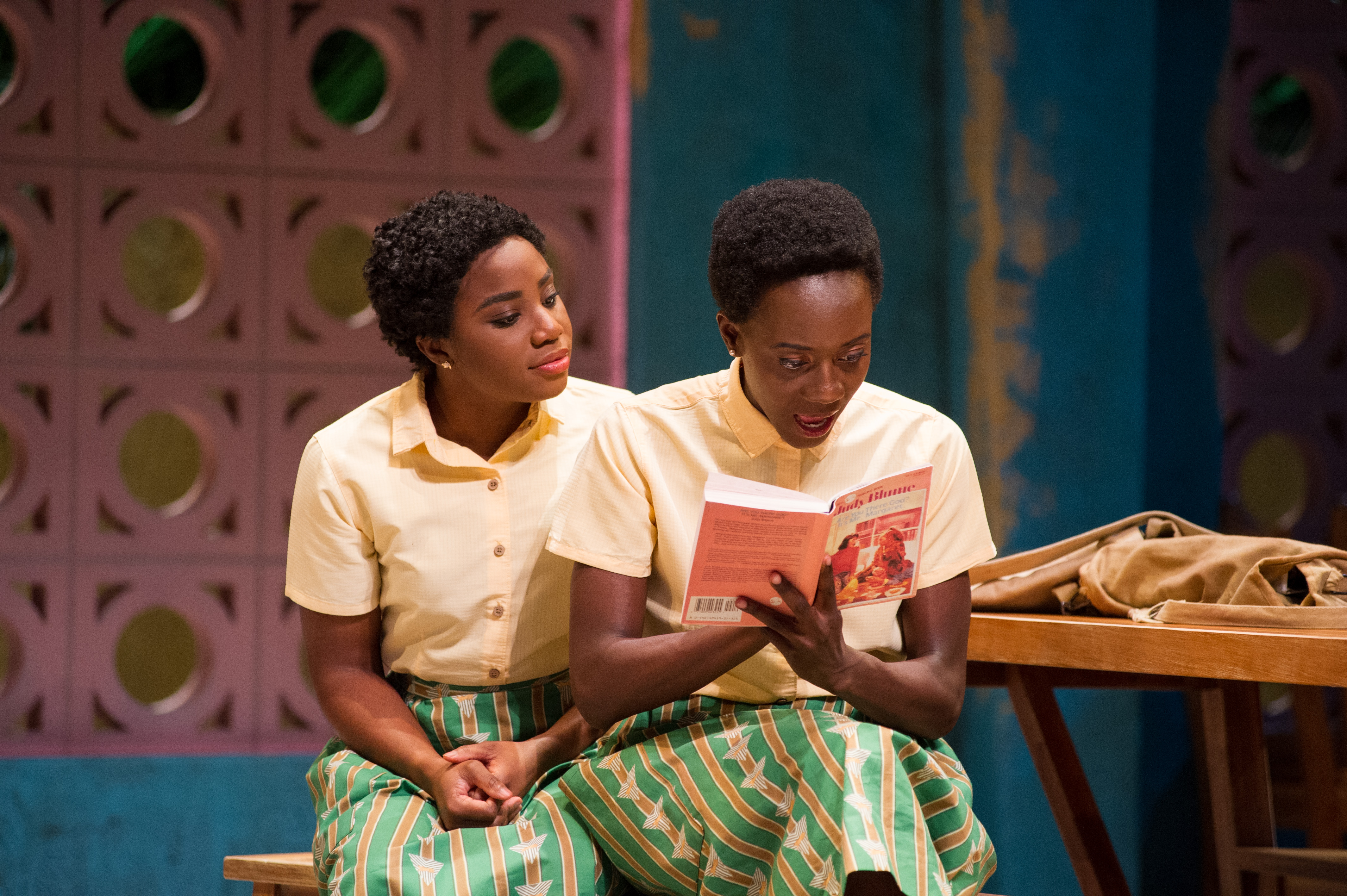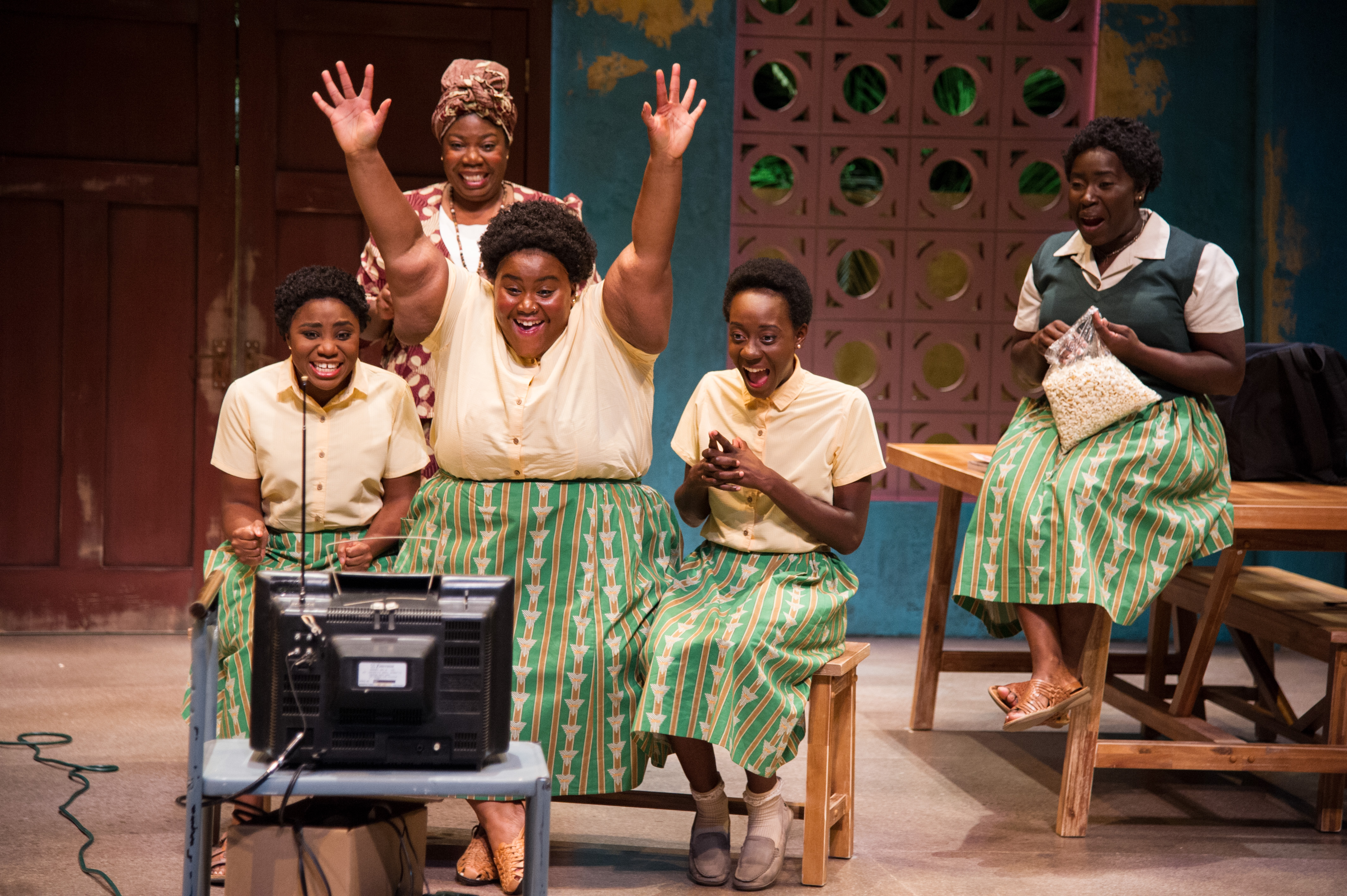In 2004, Tina Fey wrote a movie called “Mean Girls” about Queen Bees and wannabes at a typical American high school. Funny, smart and original, “Mean Girls” launched a handful of catchphrases and a Broadway musical. It also inspired Ghanaian-American playwright Jocelyn Bioh to create an award-winning Off-Broadway comedy, taking the universal experience of female friendships threatened by competing teen cliques and slippery standards of beauty and setting its inside a boarding school in Ghana.
Now Bioh’s “School Girls; Or The African Mean Girls Play” has leapt from Off-Broadway to Round House Theatre in Bethesda. Directed by Nicole A. Watson, Round House’s associate artistic director, “School Girls” features a cast of female-identifying actors who are African and African American, an all-woman creative team and a close examination of issues like colorism, colonialism and absurd beauty standards that give depth and truth to its comedy.
[foogallery id=”42692″]
“Many countries all over the world still live with the vestiges of colonialism,” Moriamo Temidayo Akibu, who plays Gifty, pointed out. “The standards we hold as beautiful and attractive are ideals that were forced on countries all over the world, based on who was colonizing — in this case England or France — telling these black and brown societies at large that ‘their’ standards of beauty were going to become ‘the’ standards of beauty in the countries they were colonizing. We see the vestiges of that every day in 2019.”
So where “Mean Girls” mined the high school experience in suburban Illinois for comedy, “School Girls” derives its humor from the sliding scales of social hierarchy among Aburi Girls Boarding School students that are hoping to compete in a beauty pageant for the ultimate prize: Miss Ghana. The Queen Bee, Paulina, is a shoo-in until fair-skinned Ericka transfers in from Ohio with her “universal and more commercial look.”
Akibu, a performer with a bachelor’s degree in theatre from the University of Maryland, can relate. “I came into the room with an understanding, a personal history and connection to things like colorism and bleaching cream and beauty standards that don’t actually have any reference in (Ghana) itself, but come over from the West,” Akibu said. The first-generation American, now based in New York and Washington, D.C., explained that “Growing up, in my house I was in Nigeria. When I stepped out, I was in the United States.”
Black beauty: from left, Moriamo Temidayo Akibu (Gifty), Claire Saunders (Ericka), Debora Crabbe (Mercy), and Awa Sal Secka (Ama) play school girls navigating the tough teen years.
C. Stanley Photography
Indeed, three “School Girls” cast members — Akibu, Awa Sal Secka (as Ama) and Debora Crabbe (Gifty’s sidekick, Mercy) — are either African immigrants themselves or first generation, something Crabbe and Akibu said imbues “School Girls” with authenticity.
“I was born in Ghana, so a lot of the references I’m pretty familiar with,” said Crabbe, whose father moved the family to the United States in 2002 for a job at the World Bank. “There are people I know who went to the boarding school in the play; but the biggest influence was just being from the country, knowing the different aspects of beauty and things they were talking about.
“It’s a universal theme,” she added. “The United States — and also the Western world — is starting to realize how colorism and racism affect the beauty industry. What is more beautiful, darker skin or whiter skin? It’s just the universal theme of the standards of beauty, infiltrating every continent and thought process. Consciously or subconsciously, we’re making decisions based on standards set eons ago, not based on what you see every day.”
Crabbe, a D.C.-based actor with a bachelor’s degree in theatre performance from Virginia Commonwealth University, grew up singing at home and in church. “My parents say I was always a performer,” she remembered. “I used to do pieces in front of the flower bushes and on the elevated cement porch in the backyard. I think I was 5 or 6 when I realized it was something I really wanted to do.”
She and Akibu see “School Girls” as an opportunity to work with a cast where women of color dominate. “Sometimes even going for a play where you see yourself as the perfect candidate for the role, either the director or someone on the artistic side just cannot fathom that it could be someone who looks like you,” Crabbe said. “If it’s not an exclusively African-American story, written by an African-American playwright, there’s that constant battle to have the people on the other side of the table see you as a plausible person to give the story to the audience.”

Akibu concurred. “If it’s not specifically and explicitly seen in the script, a lot of folks will not cast a person of color. We are pushing for this ‘new wave’ where someone committed to honoring the story can go in for the lead, the sidekick, any role. There should be so much depth to the storytelling that anybody could play the characters, whether or not they’re the same race, ethnic background, gender expression. We can continue to open up our ideas of who is ‘acceptable’ to play a role.”
Crabbe called the experience of being in a production like this one “refreshing. “The conversations that happen in this room wouldn’t happen in another place,” she said. “Knowing other people have the same experience, have climbed the same ladders, is really beautiful. There’s no devil’s advocate, no feeling of shame or nervousness. Everyone wants to help each other out, willingly. We’re all here together.”
For both these young actors, theatre means more than just finding good roles for themselves. They’re interested in changing the status quo, the way that theatres program seasons and audiences approach entertainment.
[foogallery id=”42695″]
“I am tired of seeing black and brown stories on stage where we are told to hold the trauma of the story just for the benefit of white audiences to applaud and give themselves a pat on the back,” said Akibu. “I want to continue to encourage theatre companies at large to put on stories that challenge their audiences and their artistic and executive teams.”
“School Girls” is a start. Akibu sees the comedy as “a story for the actors and the community, not just for the benefit of saying, ‘Hey, we did a good thing.’ If you’re going to put on a black story, it should showcase people of color telling in-depth stories, and they should be held, on and off the stage.
“Having a black female director lead a black female and female-identifying cast in a work by a black playwright is powerful. And (Producing Artistic Director) Ryan Rilette and Nicole and the entire team has come to our aid, making sure we are taken care of, making sure we feel empowered onstage and offstage. I really appreciate the work they’ve done to make sure we feel safe and secure and happy.”
That’s led to better production, according to Akibu. “The way we’ve been able to dive into the truth of the story, and find comedy in that truth and in these characters, could only be possible because it’s just us in the room,” Akibu explained. “We feel free to drop into that space of vulnerability, go to that place where we feel exposed telling a deep and meaningful truth.” Having women-identifying people in the cast and on the creative team, they added, “means we go straight to the point because we’ve had similar experiences and we ‘get it.’ We know it. We’ve known this story for most of our lives.”

And the audience, Crabbe noted, maybe be learning a very new story. “‘Africa’ is not what you’ve seen on television: donating five cents a day and all of that,” she said. “Because ‘School Girls’ has such a universal theme, it pushes the audience to take a second look at what they have perceived countries to be. This story is happening in the ’80s, but it’s also happening now — in Ghana, Nigeria, Senegal, Gambia, South Africa, Zimbabwe, the United States, South America.
“Just because you’re in the U.S.A. doesn’t mean there’s not a high school kid in Ghana experiencing the same things,” she added. “We may not speak with the same accent, but we’re all going through the same things.”
“School Girls; Or, The African Mean Girls Play” runs through Oct. 13 at Round House Theatre, 4545 East-West Highway, Bethesda. Performances start at 7:30 p.m. Tuesday, Wednesday and Thursday, 8 p.m. Friday and 2 p.m. Saturday and Sunday. Tickets range from $46 to $68, plus a $7 service charge. A $10 discount is available to 35 & Under patrons. Call 240-644-1100 or visit www.RoundHouseTheatre.org.